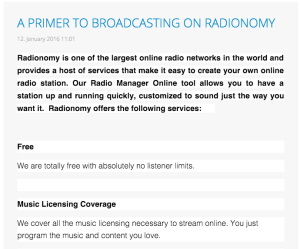Another major threat to small and medium sized internet radio stations has surfaced. As Torrent Freak first reported Tuesday, on February 26 four major recording labels filed suit in federal court against internet radio platform Radionomy, charging that the company engaged in copyright infringement.
The plaintiffs–Arista Records, LaFace Records, Sony Music and Zomba Records–allege that stations hosted by Radionomy have played music owned by them but have not paid statutory performance royalties in the US since “late 2014.” The suit also alleges that some stations available on Radionomy would not qualify for statutory licensing because they stream the music of a single artist, which is prohibited under the Digital Millennium Copyright Act.
All the more curious, the plaintiffs add that Radionomy admits to not paying royalties. In the complaint they write,
“In fact, however, Defendants do not – and have admitted to Plaintiffs that they do not – comply with any such requirements: they have no license or authorization to reproduce, publicly perform, and/or display Plaintiffs’ copyrighted works in the U.S. Moreover, Defendants have refused to comply with Plaintiffs’ requests and demands to remove the infringing works from Defendants’ service and/or to cease streaming or allowing their users to stream, reproduce, publicly perform, or display Plaintiffs’ copyrighted works on Defendants’ service.”
The labels are asking both for unspecified monetary damages as well as a permanent injunction against Radionomy from streaming without payment of royalties.
Since the demise of Live365 on January 31, an untold number of small and mid-sized webcasters moved their stations over to Radionomy. The service is attractive because it is completely free for broadcasters who have a minimum audience size. In exchange broadcasters agree to air commercials supplied by Radionomy.
Radionomy also promises on its website that its service “cover(s) all the music licensing necessary to stream online. You just program the music and content you love.”For webcasters faced with shutting down their streams as a result of new, much higher performance royalty rates, Radionomy’s deal seems irresistible. Yet, for many it also seemed too good to be true. I’ve fielded several emails from Radio Survivor readers asking us to look into Radionomy and find out how it could afford to cover both bandwidth and music royalties without charging webcasters anything. I also wondered, and have made several inquiries to Radionomy in the last month or so which have gone unanswered.
This suit from the four major recording labels would seem to indicate that the Radionomy deal for US webcasters, at the very least, may indeed be too good to be true. In fact, the complaint specifically cites Radionomy’s own marketing, charging that the company,
“assisted and encouraged others to engage in, massive reproduction, public performance, and/or display of hundreds, if not thousands, of Plaintiffs’ copyrighted sound recordings and cover art images in the U.S., in violation of the U.S. Copyright Act and California state law.”
A strange twist to the story is that Radionomy itself is majority owned by the French multinational Vivendi, which also owns the Universal Music Group, claimed to be the world’s largest recording company. That an online radio business owned by one of the world’s largest entertainment companies–and therefore a company built on intellectual property–would willfully choose not to pay copyright royalties is difficult to fathom. It would be a delicious sort of irony if there weren’t so many well-meaning small broadcasters caught up in the mix.
For better or worse, this suit answers one of my biggest questions: who, if anyone, would go after internet stations that don’t pay performance royalties? The answer is: the record labels will. However, at least at this stage, the labels are choosing to pursue a very big fish, rather than chase down schools of minnows. By suing Radionomy the labels are effectively threatening thousands of stations, but it remains to be seen if they are up to spending the necessary resources to go after individual small hobby stations that decide to go “pirate” because they can no longer afford to stay legal with royalty payment.
Radionomy also owns Winamp and the Shoutcast streaming radio technology and platform, which it purchased from AOL in 2014, saving them from imminent demise. This leads many in the internet radio community to wonder if Winamp and Shoutcast are again under threat. Shoutcast, in particular, remains important as one of the most popular streaming audio server technologies, while Shoutcast.com remains one of the most comprehensive directories of internet radio stations. It would be regrettable to see a repeat of December 2013, when AOL announced that these services would close at the end of the year.
Stay tuned, as we await a statement of some kind from Radionomy.




